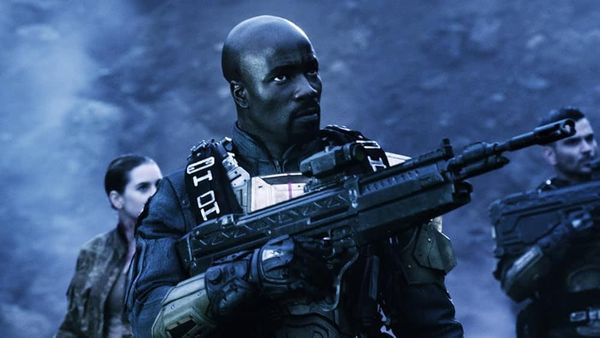Halo: Nightfall (2014)

Content and Significance of “Halo: Nightfall” (2014)
Overview:
Released in 2014, “Halo: Nightfall” is a live-action miniseries set in the acclaimed “Halo” universe. This series, produced by Scott Free Productions and 343 Industries, serves as a bridge between the events of “Halo 4” and the highly anticipated “Halo 5: Guardians.” With its deep exploration of the franchise’s lore, “Halo: Nightfall” not only expands the universe but also adds layers of complexity to its characters and themes.
Plot Summary:
“Halo: Nightfall” follows the story of Jameson Locke, a character who plays a central role in “Halo 5: Guardians.” The narrative is set on the planet Sedra, where Locke and his team are deployed to investigate a mysterious artifact that leads to an unforeseen conflict. As they delve deeper into the artifact’s origins and the ensuing threats, the series unravels the dark secrets behind the alien forces and the internal struggles of the human characters.
The plot intricately weaves together elements of action, suspense, and psychological drama. The series presents Locke as a complex figure grappling with his own past and the harsh realities of war. The storyline delves into themes of duty, sacrifice, and the personal cost of conflict, offering a rich tapestry of emotions and moral dilemmas.

Significance:
- Character Development: “Halo: Nightfall” provides a deeper understanding of Jameson Locke, a character introduced in the game series. Through his experiences, viewers gain insight into his motivations, strengths, and vulnerabilities. This development is crucial for fans of the series, as it enriches their connection to Locke’s character in “Halo 5: Guardians.”
- Expanding the Halo Universe: The miniseries enhances the “Halo” lore by exploring new facets of the universe. The story introduces viewers to the planet Sedra and its unique challenges, expanding the narrative beyond the familiar settings of the games. This world-building adds depth to the franchise and provides a broader context for the events that unfold in the games.
- Themes and Exploration: The miniseries delves into themes of loyalty, leadership, and the impact of war on individuals and societies. By focusing on both the external conflicts and the internal struggles of the characters, “Halo: Nightfall” offers a nuanced exploration of the human condition amidst the backdrop of an interstellar conflict.
- Visual and Narrative Style: The live-action format allows for a more immersive experience, blending high-quality visuals with engaging storytelling. The series’ production values reflect the epic scale of the “Halo” universe, while its narrative style maintains the franchise’s hallmark of combining action with deep character studies.

Conclusion:
“Halo: Nightfall” stands as a significant addition to the “Halo” franchise, offering both fans and newcomers a compelling look at the universe’s complexities. By focusing on character development, expanding the lore, and exploring profound themes, the miniseries enhances the overall narrative of the franchise. Its contribution to the “Halo” universe ensures that it remains a vital piece of the larger storytelling tapestry, bridging gaps between major installments and enriching the experience for its audience.











